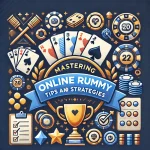Description

The Complete Guide to Rummy The card game rummy has been a favorite for centuries and has a long and varied history dating back to the early 1800s. Rummy is thought to have developed from earlier card games like Conquian, which originated in Mexico, though the game’s exact origins are still a little unclear. Because of its similar mechanics, which revolve around creating melds and sets, Conquian is frequently considered the forerunner of modern Rummy. The game experienced multiple adaptations as it traveled across borders, giving rise to the wide variety of Rummy variations that are available today. Rummy arrived in the US by the late 1800s & quickly became very popular there, especially with families and social circles.
Indian rummy and gin rummy are two variations of rummy that have developed over time, each with its own set of rules & tactics. The combination of skill & chance in the game makes it appealing to players of all ages and backgrounds. Rummy became a common game in American homes in the early 20th century, frequently being played at social events and family get-togethers.
Rummy’s reputation as a popular hobby was further cemented with the emergence of organized play in the middle of the 20th century. In addition to being a well-liked pastime, rummy is now a competitive sport, with tournaments held all over the world that draw both professional and amateur players. The fundamental idea behind Rummy is to use a standard deck of cards to form sets and runs. Making melds, or combinations of three or more cards that are either in sequential order within the same suit or share the same rank, is the fundamental goal. Players alternately draw cards from the discard pile or the stockpile, & at the conclusion of their turn, they discard one card. Until one player successfully melds every card in their deck, declaring “Rummy” & ending the round, the game goes on.
There are many variations that offer different twists & challenges, even though these basic rules offer a strong basis for gameplay. Gin Rummy is one of the most well-liked variants, emphasizing deft play and calculated choices. Players in Gin Rummy try to minimize the value of the unmelded cards in their hands while forming melds.
Indian Rummy, which usually uses two decks of cards & requires players to form at least two sequences—one of which must be a pure sequence devoid of jokers—is another noteworthy variation. Other variations include Canasta, which adds a collaborative element by enabling players to form melds with partners, and Kalooki, which adds wild cards and extra scoring rules. Every variation adds a unique flavor to the game, so players can choose one that fits their tastes and ability level.
Rummy is more than just a card game; it’s a social activity that helps players build relationships with one another. Rummy promotes interaction & friendship whether it is played in more competitive settings or in more relaxed settings with friends. Due to the turn-based nature of the game, players can interact & converse with one another, fostering a friendly competitive environment. Many people remember happy times spent playing Rummy and laughing & telling stories with friends or family around a table. One of the factors contributing to the game’s longevity across generations is its social component.
Also, rummy acts as a unifying factor for people of all ages and cultures. Its straightforward rules allow novices to play while still providing experienced players with depth. Families get together to bond over the game of rummy during holidays and other special occasions in many cultures. Players develop a sense of community through their common experience of planning strategies, bluffing, and celebrating wins. The social component of rummy is still strong as online platforms and technological advancements allow players from all over the world to virtually connect while playing this classic card game. Beyond simply being entertaining, playing rummy has several mental health advantages that can strengthen critical thinking abilities and cognitive function.
Because of the strategic nature of the game, players must constantly evaluate their hands, consider possible moves, and predict what their opponents will do. Mental skills like memory retention and problem-solving are stimulated at this level of engagement. Over time, players develop sharper cognitive skills as they must recall which cards have been played & compute probabilities based on the options available. Also, rummy can be a useful stress-relieving game.
Because of the game’s immersive qualities, players can concentrate on strategy instead of their everyday concerns or anxieties. A better mood and general state of wellbeing may result from this mental diversion. Also, by keeping older adults’ minds engaged and active, regular play of games like Rummy has been associated with a delay in cognitive decline. So, in addition to providing entertainment, rummy also helps people of all ages with their mental health.
Popular culture has been influenced by rummy in a number of ways, including television, movies, & literature. The game’s social significance & function as a character-bonding activity are frequently reflected in its presence in these media. For example, card games, such as Rummy, are used by characters in many classic novels to highlight relationships or create tension in the story. Through gameplay, these depictions show how card games can be used as a platform for interpersonal communication, exposing motivations and character traits.
Rummy has made an appearance in television series & movies in addition to literature, where it is frequently portrayed as a relaxed activity enjoyed by friends or family. These depictions support the notion that rummy is a multigenerational cultural phenomenon rather than merely a game. Also, as online gaming platforms have grown in popularity, rummy has become more well-known in modern society as players post about their experiences on social media and streaming services. While maintaining the game’s traditional roots, this online presence has assisted in bringing it to new audiences. Over time, the competitive nature of rummy has increased dramatically, resulting in the creation of multiple tournaments and competitions across the globe. Players from a variety of backgrounds attend these events to demonstrate their abilities & tactics in competitive settings.
Various formats are frequently used in tournaments; some may concentrate on particular variations, such as Indian or Gin Rummy, while others may take a more inclusive stance by permitting several game versions. In addition to financial rewards, players vie for recognition in the gaming community. Rummy tournaments are usually set up with several rounds in which players compete against one another in round-robin or elimination-style formats.
The thrill increases as players must follow stringent guidelines & time constraints while navigating through challenging gameplay. These contests help players who are passionate about the game feel more connected to one another. They also offer chances to network and gain knowledge from seasoned players who can provide insightful commentary on sophisticated tactics and methods.
Technology’s introduction has changed how people play Rummy, which has resulted in an increase in online sites devoted to this popular card game. Players can now use mobile applications to play rummy while on the go or in the comfort of their own homes. Avatar customization, real-time multiplayer options that link players worldwide, and interactive tutorials for novices are just a few of the features that Online Rummy offers to improve gameplay experiences. Thanks to the digital revolution, enthusiasts can now locate opponents at any time of day or night more easily than before. Also, new formats like tournaments with bigger prize pools & leaderboards that monitor player rankings over time have been introduced by online platforms.
These elements not only increase the level of excitement but also encourage healthy rivalry among players who aim to advance in the rankings and develop their skills. Also, a lot of online platforms include social features like forums or chat rooms where users can exchange experiences or talk about strategies with other fans. Online rummy is expected to grow even more as technology advances, drawing in new players while maintaining its classic appeal. It is evident that Rummy will continue to change in the future in tandem with shifting social mores & technological breakthroughs.
The game’s versatility has kept it relevant for generations, but even more creative advancements could be in store for it in the future. For example, by producing immersive environments that mimic real-life gameplay scenarios, augmented reality (AR) and virtual reality (VR) technologies have the potential to completely transform how players experience rummy. While offering special challenges that keep seasoned players interested, such developments would also improve social interactions. Also, as online gaming gains popularity worldwide, we might see more international competitions that use competitive play to unite people from different cultural backgrounds. As players combine conventional rules with local influences, new variations may arise as a result of globalization, further enhancing the game’s overall fabric. Rummy’s ability to evolve while promoting relationships among players is ultimately what makes it so popular, whether it is played in person or online.
This is evidence of its enduring appeal as one of the most beloved card games in the world.
